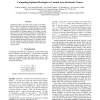Free Online Productivity Tools
i2Speak
i2Symbol
i2OCR
iTex2Img
iWeb2Print
iWeb2Shot
i2Type
iPdf2Split
iPdf2Merge
i2Bopomofo
i2Arabic
i2Style
i2Image
i2PDF
iLatex2Rtf
Sci2ools
149
Voted
AAAI
2012
2012
Computing Optimal Strategies to Commit to in Stochastic Games
Significant progress has been made recently in the following two lines of research in the intersection of AI and game theory: (1) the computation of optimal strategies to commit to (Stackelberg strategies), and (2) the computation of correlated equilibria of stochastic games. In this paper, we unite these two lines of research by studying the computation of Stackelberg strategies in stochastic games. We provide theoretical results on the value of being able to commit and the value of being able to correlate, as well as complexity results about computing Stackelberg strategies in stochastic games. We then modify the QPACE algorithm (MacDermed et al. 2011) to compute Stackelberg strategies, and provide experimental results.
Related Content
| Added | 29 Sep 2012 |
| Updated | 29 Sep 2012 |
| Type | Journal |
| Year | 2012 |
| Where | AAAI |
| Authors | Joshua Letchford, Liam MacDermed, Vincent Conitzer, Ronald Parr, Charles L. Isbell |
Comments (0)

